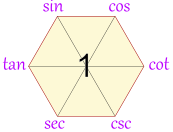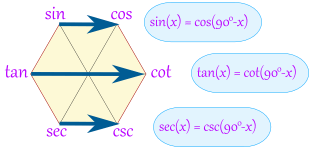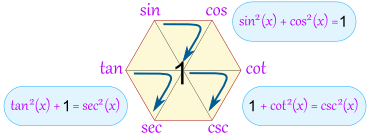العلاقة بين العدد 1 والنسب المثلثية
العلاقة بين العدد 1 والنسب المثلثية
 |
| Clockwise |
|
| Counterclockwise |
|
Product Identities
The hexagon also shows that a function between any two functions is equal to them multiplied together (if they are opposite each other, then the "1" is between them):
 | |
| Example: tan(x)cos(x) = sin(x) | Example: tan(x)cot(x) = 1 |
Some more examples:
- sin(x)csc(x) = 1
- tan(x)csc(x) = sec(x)
- sin(x)sec(x) = tan(x)
 | Here you can see that sin(x) = 1 / csc(x) |
Here is the full set:
- sin(x) = 1 / csc(x)
- cos(x) = 1 / sec(x)
- cot(x) = 1 / tan(x)
- csc(x) = 1 / sin(x)
- sec(x) = 1 / cos(x)
- tan(x) = 1 / cot(x)
Bonus!
AND we also get these:

Examples:
- sin(30°) = cos(60°)
- tan(80°) = cot(10°)
- sec(40°) = csc(50°)
Double Bonus: The Pythagorean Identities
The Unit Circle shows us that
sin2 x + cos2 x = 1
The magic hexagon can help us remember that, too, by going clockwise around any of these three triangles:

And we have:
- sin2(x) + cos2(x) = 1
- 1 + cot2(x) = csc2(x)
- tan2(x) + 1 = sec2(x)
You can also travel counterclockwise around a triangle, for example:
- 1 - cos2(x) = sin2(x)
العلاقة بين العدد 1 والنسب المثلثية
![العلاقة بين العدد 1 والنسب المثلثية]() Reviewed by . blogmathappily
on
2:36 م
Rating:
Reviewed by . blogmathappily
on
2:36 م
Rating:
